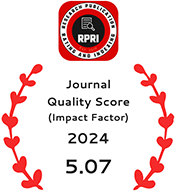Susceptibility of Staphylococcus spp. to the Plant Crude Extract
DOI:
https://doi.org/10.55544/jrasb.3.2.20Keywords:
Thuja orientalis, Staphylococcus aureus, MRSA, Antibacterial activityAbstract
The study aimed to investigate whether the extract from the Thuja orientalis plant had any antibacterial properties against fifteen MRSA isolates in a group of thirty-seven Staphylococcus aureus isolates. To determine bacterial resistance, an antibiotic susceptibility test was conducted on five different drugs. Methicillin showed the highest level of bacterial resistance (100%), whereas Vancomycin had the lowest level of resistance (6.6%). The results of the examination of the Thuja orientalis plant extract clearly showed that it had a significant suppressive effect on all Staphylococcus aureus isolates.
Downloads
References
Al-Roubai, S., Abdulkareem, M., Mahmood, A., & Khaleefah, A. (2020). Inhibition activity of Thuja occidentalis fruit extract against Staphylococcus aureus and E. coli isolated from cases of mastitis in Baghdad/Iraq. Biochem Cell Arch, 20(2), 3579-83.
Amoako, D. G., Somboro, A. M., Abia, A. L., Molechan, C., Perrett, K., Bester, L. A., & Essack, S. Y. (2020). Antibiotic resistance in Staphylococcus aureus from poultry and poultry products in uMgungundlovu District, South Africa, using the “Farm to Fork” approach. Microbial Drug Resistance, 26(4), 402-411.
Anesininy,C. and Perez,C. (1993). Screening of plant used in Agrentine folk medicine for antimicrobial activity. J. Ethanopharmacol., 39 (2): 119-128.
Bellido, J. L. M. (2017). Mechanisms of resistance to daptomycin in Staphylococcus aureus. Rev. Esp. Quimioter, 30, 391-396.
Bergey, D. H. (1994). Bergey's manual of determinative bacteriology. Lippincott Williams & Wilkins.
CLSI. Performance Standards for Antimicrobial Susceptibility Testing, 30th ed. CLSI. Supplement M100. Wayne, PA: Clinical and Laboratory Standards Institute; 2020.
Das DC, Sinha NK, Patsa MK. and Das M. (2015). Investigation of herbals for the treatment of leucorrhoea from south west Bengal, India. International Journal of Bioassays; 4(11): 4555- 4559
ELSHARkAwY, E. R., & Ali, A. M. (2019). Effect of Drought Condition of North Region of Saudi Arabia on Accumulation of Chemical Compounds, Antimicrobial and Larvicidal Activity of Thuja Orientalis. Oriental Journal of Chemistry, 35(2), 738.
Farjon, A. (2005). Monograph of Cupressaceae and sciadopitys
Gurung, R. R., Maharjan, P., & Chhetri, G. G. (2020). Antibiotic resistance pattern of Staphylococcus aureus with reference to MRSA isolates from pediatric patients. Future science OA, 6(4), FSO464.
Höld, K. M., Sirisoma, N. S., Ikeda, T., Narahashi, T., & Casida, J. E. (2000). α-Thujone (the active component of absinthe): γ-aminobutyric acid type A receptor modulation and metabolic detoxification. Proceedings of the National Academy of Sciences, 97(8), 3826-3831.
Kale, P., & Dhawan, B. (2016). The changing face of community-acquired methicillin-resistant Staphylococcus aureus. Indian journal of medical microbiology, 34(3), 275-285.
Mirzaie, A., Peirovi, N., Akbarzadeh, I., Moghtaderi, M., Heidari, F., Yeganeh, F. E., ... & Bakhtiari, R. (2020). Preparation and optimization of ciprofloxacin encapsulated niosomes: A new approach for enhanced antibacterial activity, biofilm inhibition and reduced antibiotic resistance in ciprofloxacin-resistant methicillin-resistance Staphylococcus aureus. Bioorganic chemistry, 103, 104231.
Rojo, P., Barrios, M., Palacios, A., Gomez, C., & Chaves, F. (2010). Community-associated Staphylococcus aureus infections in children. Expert Review of Anti-infective Therapy, 8(5), 541-554.
Romaniuk, J. A., & Cegelski, L. (2015). Bacterial cell wall composition and the influence of antibiotics by cell-wall and whole-cell NMR. Philosophical Transactions of the Royal Society B: Biological Sciences, 370(1679), 20150024.
Ryu, S., Song, P. I., Seo, C. H., Cheong, H., & Park, Y. (2014). Colonization and infection of the skin by S. aureus: immune system evasion and the response to cationic antimicrobial peptides. International journal of molecular sciences, 15(5), 8753-8772.
Sirichoat, A., Lulitanond, A., Kanlaya, R., Tavichakorntrakool, R., Chanawong, A., Wongthong, S., & Thongboonkerd, V. (2016). Phenotypic characteristics and comparative proteomics of Staphylococcus aureus strains with different vancomycin-resistance levels. Diagnostic Microbiology and Infectious Disease, 86(4), 340-344.
Vandepitte, J. (2003). Basic laboratory procedures in clinical bacteriology. World Health Organization.
Downloads
Published
How to Cite
Issue
Section
License
Copyright (c) 2024 Sulaiman Dawod Sulaiman, Haider Hamid Khudiar, Tiba Ayad Ahmed Sezae

This work is licensed under a Creative Commons Attribution-NonCommercial-NoDerivatives 4.0 International License.


















